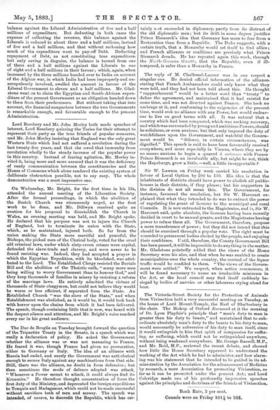On Wednesday, Mr. Bright, for the first time in his
life, -attended the annual meeting of the Liberation Society. After the formal proceedings, in which the abolition of the Scotch Church was strenuously urged, as the first work to be done, and Mr. Dillwyn received quite an -ovation for his proposal to disestablish the Church in Wales, an evening meeting was held, and Mr. Bright spoke. He declared that his purpose was not to injure the Church -of England, but to terminate its union with the State, which, as he maintained, injured both. So far from the -union making the State more merciful and peaceful, the Bishops, the picked men of the Clerical body, voted for the cruel -old criminal laws, under which sixty-seven crimes were capital, defended the slave-trade and slavery, and were never to be found resisting war. Indeed, they bad accepted a prayer in -which the Egyptian Expedition, with its bloodshed, was attri- buted to the Lord. The Established Clergy resisted the Burials Bill and the abolition of the Theistic oath, "many more men being willing to worry Government than to honour God," and they keep thousands of families in misery by resisting a reform of the marriage laws. He entirely admitted the virtues of thousands of State clergymen, but could not believe they would be worse or less efficient, if separated from the State. An Established Church "was the slave of the State," and when Establishment was abolished, as it would be, it would look back with horror upon the chains from which it had been delivered. The speech, though containing little that is new, was heard with the deepest silence and attention, and Mr. Bright's voice reached every ear in his great audience.


































 Previous page
Previous page